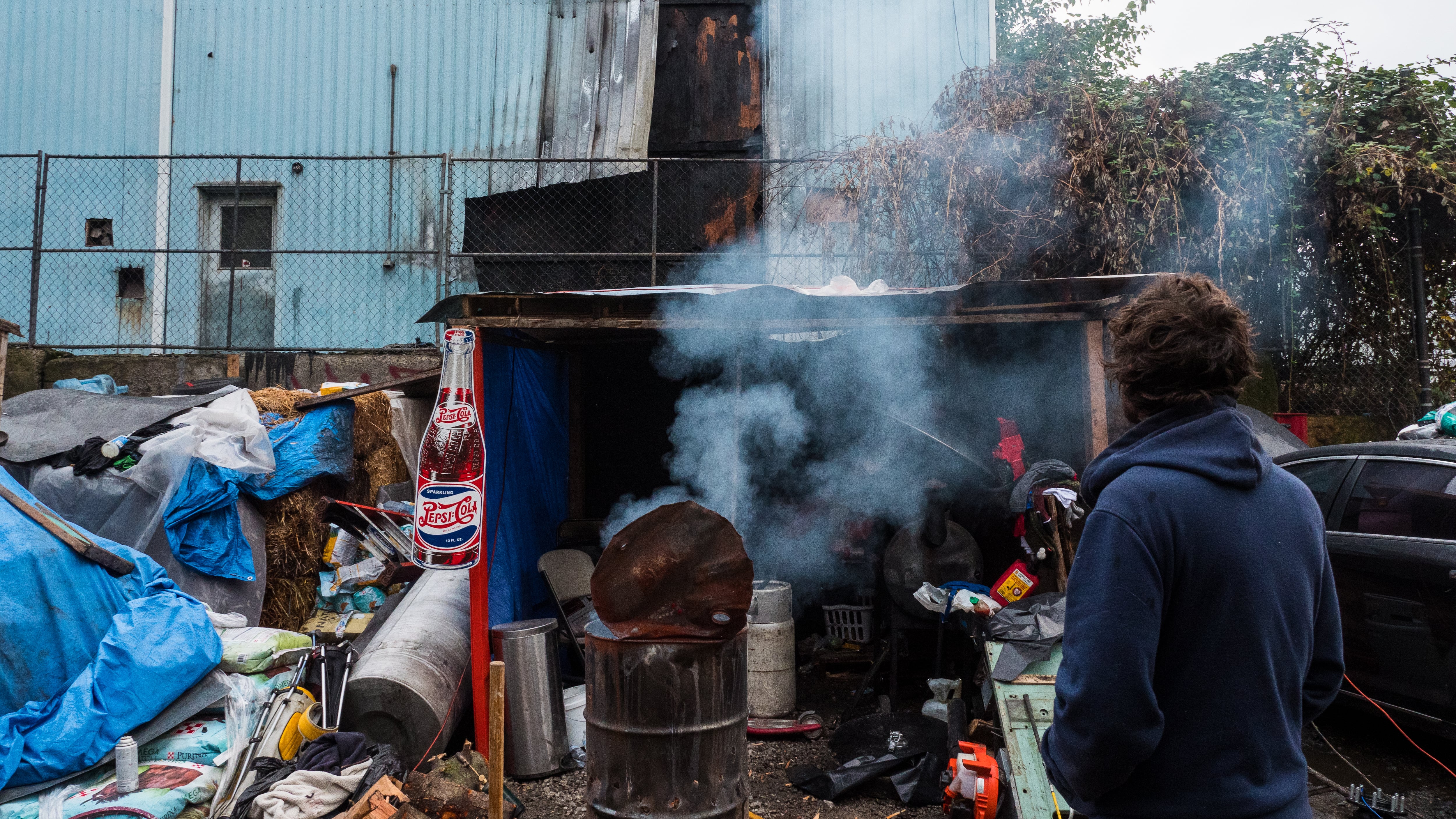The Portland City Council today passed an ambitious slate of resolutions aimed at combatting homelessness.
The most controversial resolution crafted by Mayor Ted Wheeler and City Commissioner Dan Ryan pledges the city will build six massive sanctioned campsites with capacity for 250 people each and implement a phased-in ban on street and sidewalk camping. The vote comes less than a week before an election in which voter outrage over the scale and squalor of Portland’s camping has become the defining issue.
The council passed each of the resolutions unanimously, except for one.
Commissioner Jo Ann Hardesty cast the lone vote against the mass campsites and camping ban, saying that such a ban before the campsites are ready is “cruel and inhumane.” She said people told her it would be the politically smart decision to support it, given the fierce reelection fight she faces against challenger Rene Gonzalez.
“It would be easy for me to just vote yes and be quiet. This resolution will make a lot of people in this city feel good, and make them feel a solution is right around the corner,” Hardesty said. “The solution outlined here isn’t real. I can’t forget, I won’t forget, those who do not have the resources to sway politics, let alone feed and house themselves.”
She noted, correctly, that none of the resolutions is yet funded. At this point, they are purely aspirational.
Prior to the vote and more than four dozen testimonials from Portlanders either in support of or opposition to the resolutions, Hardesty and Commissioner Carmen Rubio laid out a dozen amendments to the proposals. Two of Hardesty’s amendments were adopted: that the city aspires to provide adequate services for houseless people with disabilities and that any expansion of camp capacity is first brought to the council.
Both of Rubio’s amendments were adopted, the more notable one setting a maximum capacity on the sanctioned campsites of 250 people and increasing the number of sites to six. That’s a change from an initial plan of three campsites each with capacity for 500 people.
Perhaps surprisingly, Rubio did not offer a second to Hardesty’s motion proposing that the city not implement an outright citywide ban on camping but instead work with partners to develop policies that would help limit camping. Rubio ultimately voted in support of the resolution.
Just hours before the meeting commenced, the American Civil Liberties Union of Oregon told City Council members that it would pursue legal action if the city moved forward with creating mass encampments and banning sidewalk camping. The ACLU requested that the hearing be postponed until the City Council consulted with housing experts and homeless Portlanders.
The council did not postpone its vote.
The ACLU listed possible violations of the First and Eighth amendments as its basis for legal action, alleged that city officials heavily consulted with business owners in crafting this policy, and also warned the city that its camping ban would violate the federal 9th Circuit Court of Appeals’ Martin v. Boise ruling. The ACLU’s full statement can be found here.
The more than 40 people who testified before the council prior to the vote included houseless Portlanders, business owners, homeowners, housing experts, housing nonprofit leaders, and renters.
Jennifer Parrish Taylor, director of advocacy and public policy for the Urban League of Portland, spoke against the sanctioned campsites, calling them the ”counter [to] all known best practices for ending homelessness.”
“Banning public camp and creating mass camps will direct resources away from the region’s greatest need: housing,” Parrish Taylor said.
A number of houseless Portlanders told the council that banning camping would make their current situations more difficult, and others said they wouldn’t feel safe in a camp with 150 other residents.
“It’s hurting and killing people to force people off the streets,” Randy Humphreys said.
But polling commissioned by the Portland Business Alliance shows 8 in 10 Portland voters support the ban, and other surveys show homelessness is the top issue for Oregon voters. In five days, those voters will decide whether to abandon the Democratic Party and whether to fundamentally reshape city government.
The sanctioned campsites and camping ban appear to be a yearlong culmination of a controversial plan laid out earlier this year by mayoral aide Sam Adams, which at the time was met with scorn by some elected officials.
Wheeler, who has sought to leverage the election to garner support and funding for his mass-campsite plan, painted the vote as a first step toward addressing a problem that has seemingly overwhelmed city government.
“Our goal is to connect people to the services they need to get off and stay off the streets,” Wheeler said. “Our resolutions acknowledge the reality in Portland and set direction on what we hope to achieve.”
The five resolutions and the vote totals by which they passed are listed below.
1. Pledge to start construction on 20,000 units of affordable housing by 2033 (5-0 vote).
2. Build six massive sanctioned campsites with maximum capacity of 250 apiece. Camps would be outfitted with basic sanitation services like restrooms and laundry facilities. Couple the campsites with a phased-in ban on unsanctioned camping citywide (4-1, Hardesty dissenting).
3. Along with the Multnomah County District Attorney’s Office and other partners, create diversion programs for homeless Portlanders when cited for camping so as to avoid a citation on their criminal records (5-0).
4. Create more opportunities for unhoused Portlanders to get paying jobs through new programs (5-0).
5. Request money from state, regional and local partners, including Multnomah County, the state and Metro (5-0).

